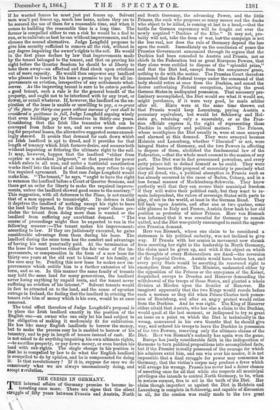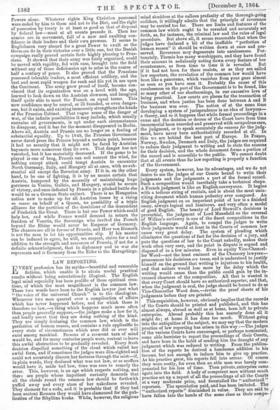THE CRISIS IN GERMANY. T HE internal affairs of Germany promise
to become in- teresting once more. There are signs that the silent struggle of fifty years between Prussia and Austria, North and South Germany, the advancing Power, and the little Princes, the cook who proposes so many sauces and the ducks who object to be killed, is coming at last to a head,—that the battle for German supremacy will be fought out over the newly acquired "Duchies of the Elbe." It may not, pro- bably will not, take the form of war, buirthe campaign is not the less real, nor does the rule of Germany depend the less upon the result. Immediately on the conclusion of peace the Prussian Government announced through its organs that the Duchies had been conceded to Austria and Prussia, not as chiefs in the Federation but as great European Powers, that they alone were entitled to dispose of the "splendid prize," and that the Diet had, except from the conquerors' grace, nothing to do with the matter. The Prussian Court therefore demanded that the Federal troops under the command of that body should retire at once from the Duchies, and cancel the decree authorizing Federal occupation, leaving the great German States in undisputed possession. That necessary pre- liminary accomplished, the Diet would see what it would see, might perchance, if it were very good, be made arbiter after all. Hints were at the same time thrown out that Prussia would keep Lauenburg, paying Austria a pecuniary equivalent, but would let Schleswig and Hol- stein go, retaining only a suzerainty, or as the Prus- sian officials express it, the right of representing those Duchies in military and political matters. The Princes, whose mouthpiece the Diet usually is, were at once annoyed and alarmed at this demand. They were annoyed because Holstein and Lauenburg, whether "liberated" or not, were integral States of Germany, and the two Powers in affecting to dispose of them, abolished the fundamental law of the Federation, —that the whole must consent to the cession of any part. The Diet was in fact pronounced powerless, and every petty prince left to defend himself as he could. They were alarmed because this proposal of suzerainty is precisely what they all dread, viz., a political absorption in Prussia such as has already occurred in the cases of Baden, Coburg, and in a less formal manner of Mecklenburg-Schwerin. They know perfectly well that they can secure their municipal freedom if they will waive their political rank, but they want to re- main independent, the rulers of sovereign States with parts to play, if not in the world, at least in the German Buud. They fell back upon Austria, and after one or two qualms, some side glances to Italy and France, Austria drew back to her old position as protector of minor Princes. Herr von Bismark was informed that it was essential for Germany to remain united, and the Diet was quietly encouraged to resist the aggres- sive Prussian demand.
Herr von Bismark, whose one claim to be considered a statesman is his political audacity, was not inclined to give way. If Prussia with her armies in movement now shrank from asserting her right to the leadership in North Germany, the claim must be given up, and with it the object on which the thoughts of every Hohenzollern are fixed—the reversion of the Imperial Crown. Austria would have beaten her, and every petty State would be asserting its recovered right to exemption from advice. The Minister, undaunted either by the opposition of the Princes or the annoyance of the Kaiser, despatched envoys to Dresden and Hanover demanding the withdrawal of the troops of those States, and planted a whole division at Minden upon the frontier of Hanover. He imagined apparently that the two Kings would recede before such a menace as they did when Prince Charles took posses- sion of Rendsburg, and after an angry protest would retire from the Duchies. And he was right. The King of Hanover either afraid that Austria, who has also a claim to the Duchies, would quail at the last moment, or indisposed to try so great an issue on a point on which the Diet is technically in the wrong, announced in his own Gazette that he should give way, and ordered his troops to leave the Duchies in possession of the two Powers, reserving only the ultimate claims of the Diet. Herr von Bismark's audacity has again won the game. Europe has justly considerable faith in the indisposition of Germans to turn political propositions into accomplished facts, but if the Premier is really possessed of the courage for which his admirers extol him, and can win over his master, it is not impossible that a final struggle for power may commence. in Germany, that the victim's corpse may produce a fever which will avenge his wrongs. Prussia has never had a fairer chance of asserting once for all that while she respects all municipal privileges she intends to control North Germany, to be, when in serious earnest, free to act in the teeth of the Diet.. Her claim though imperfect as against the Diet in Holstein and Lauenburg is complete in Schleswig, and capable of discussion in all, for the cession was really made to the two groat
Powers alone. Whatever rights King Christian possessed were ceded by him to them and not to the Diet, and the right of possession by treaty is at least as good as that of disposal by federal law—must at all events precede it. Then her armies are in movement, full of a new and exulting con- fidence in their leaders and their own prowess. It seems to Englishmen very absurd for a great Power to exult as the Germans do in their victories over a little one, but the Danish campaign really proved certain facts highly pleasing to Prus- sians. It showed that their army was fairly organized, could be moved with rapidity, fed with ease, brought into the field without any of those deficiencies apt to arise in the course of half a century of peace. It also proved that the Prussians possessed tolerable leaders, a most efficient artillery, and the best and most rapid weapon for rank and file yet in use upon the Continent. The army grew proud of itself, became con- vinced that its organization was on a level with the age, learned to look down on the Austrian slowness, and imagined itself quite able to meet the French on equal terms. This new confidence may be unreal, or ill founded, or even danger- ous but it exists, and existing immensely strengthens the hands of the Prussian Cabinet. That vague sense of the danger of war, of the infinite possibilities it may include, which usually restrains all governments, is apt under such circumstances to disappear, and it has for the moment disappeared in Berlin. Above all, Austria and Prussia are no longer on a footing of substantial equality. Up to 1848, the Prussian Government never dared press the Princes beyond a certain point, because it had no security that it might not be faced by Austrian bayonets more numerous than its own. That danger has not vanished, but it has materially decreased. If the game to be played is one of brag, Prussia can sail nearest the wind, for nothing except attack could tempt Austria to encounter North Germany, Italy, and Hungary all at once, with no sub- stantial aid except the Bavarian army. If it is, on the other hand, to be one of fighting, it is by no means certain that Austria, hampered by the necessity of maintaining huge garrisons in Venice, Galicia, and Hungary, would be secure of victory, and once defeated by Prussia in a pitched battle she would be as a German State extinct. There is no Hungarian nation now to make up for all Austrian losses by a riga..
' en nzasse on behalf of a Queen no possibility of a triple alliance for the partition of the dominions of the descendant of Frederick the Great. There is but one Power which could help her, and while France would demand in return the freedom of Venetia, the Sovereign who invited the French beyond the Rhine would never be Emperor of Germany. The chances are all in favour of Prussia, and Herr von Bismark is not the man to let his opportunities slip. If his master can be induced to agree, he will, we suspect, strive for a real addition to the strength and resources of Prussia, if not for a definite acknowledgment, that in diplomacy and in war she represents and is Germany from the Eider to the Herzgebirge.































 Previous page
Previous page